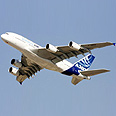Over 60% of people worldwide want to fly more by 2050, but almost all – 96%- believe that aircraft need to be more environmentally efficient, according to a study from aircraft-maker Airbus.
With findings drawn from a 10,000-strong survey, the plane maker also consulted with 1,75 million people in 192 countries over a two-year period, to better understand the public perception of air travel’s future.
Mile High
Deal with Israel's second biggest airline would break longstanding Boeing monopoly on local passenger jet market. Deals also underway with Russia, Asia
Released just before the Farnborough International Air show, the study indicates that quieter aircraft are important (backed by 66% of respondents), while almost 40% felt that the air-travel experience is increasingly stressful.
Airbus, part of European aerospace group EADS, carried out the research alongside the development of Concept Plane, which illustrates what air transport could look like as early as 2030, although more likely by 2050.
The graceful, spaceship-like prototype brandishes long, slim wings, semi-embedded engines, a U-shaped tail and a light-weight fuselage. The result, Airbus says, will be lower fuel burn and a significant cut in emissions.
Airbus has also rethought cabin configuration, replacing first, business and economy classes with personalized zones. Passengers will be able to stargaze through a transparent wall membrane from “morphing” seats that harvest body heat for power.
Champion said that the Concept was built to add to the debate and to try to visualize what future flight could look like.
“We wanted to know if people still wanted to fly, and what are the priorities of the generation of today. It was an interesting exercise and the enthusiasm for flight has motivated our engineers into designing great new ways to fly in the future.”
Airbus says that more than 90% percent of the 2 billion Euros it spends annually on research and development is directed at improving the environmental performance of its aircraft, and points out that a passenger on its flagship A380 uses just three liters of fuel to travel 100 km, the same as a small family car.
Once it enters service in late 2015, the A320neo’s engines will, the plane maker predicts, provide up to 15% in fuel savings, while the lightweight carbon-plastic A350 XWB is set to provide a 25% step-change in fuel efficiency from its planned early-2014 launch.
The aviation industry as a whole has, says Airbus, reduced fuel burn and emissions by 70% and noise by 75% in the past 40 years. Carbon neutral growth is a target for 2020, with a 50% net CO2 emissions reduction by 2050.
Half of these savings will come from better air-traffic management, says Airbus.
In the meantime, the plane maker isn’t finding local environmental regulations helpful. Airbus has blamed European Union moves to tackle carbon emissions for the suspension of long-distance jet orders worth up to $14 billion, and has backed China’s refusal to accept the EU’s emissions trading scheme.
Opponents of the scheme, which include the United States and other nations, have called for a unilateral emission-reduction plan from ICAO, the United Nations body which oversees civil aviation, to be agreed by all 191 members.

Airbus A380
Photo: Reuters
מומלצים















